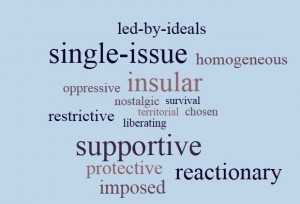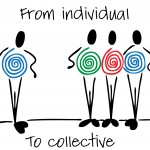What is community
 There are lots of issues to consider as we talk increasingly about decentralisation and handing power to communities. The notion and reality of ‘community’ is complicated!
There are lots of issues to consider as we talk increasingly about decentralisation and handing power to communities. The notion and reality of ‘community’ is complicated!
We often make assumptions about ‘community’ being essentially ‘a good thing’. This may be based on a sense of nostalgia or idealism. In reality there are many different associations about ‘community’.
The word cloud on the left helps us to think about ‘community’ in different ways – all of these words describe possible motivations for, or behaviour of, communities and illustrates how they can mean different things to different people at different times.
Community itself is a contested concept and some people don’t believe that it is useful.
The important thing is that we are clear about what we mean by ‘community’ in any particular context and are aware of:
- the complexities of ‘community’
- who you are engaging with and not engaging with in a particular ‘community’
- the implications of assuming or imposing ‘community’ onto people
- assumption about ‘us’ and ‘them’ – we are all likely to be part of some kind of community
The notion of ‘community’ is multi layered and may be understood as:
- A group of people who live in a specific locality, neighbourhood – communities of place or geographic communities, with shared experience and/or shared concerns
- A group of people who have a shared identity, shared history, belief or perspective – communities of identity
- Interests or occupations that people have in common – communities of interest
- A social network of individuals who interact through virtual media, potentially crossing geographical and political boundaries in order to pursue mutual interests or goals – virtual communities
Some footnotes
- People can belong to more than one community at a time
-
People may move in and out of communities, depending on a range of factors including time, motivation and need
-
Not everybody may identify as being part of a community
-
Some people may be excluded from communities because of discrimination, or may choose to exclude themselves
-
‘Community’ can be presumed, chosen or imposed
- imposing ‘false’ communities isn’t particularly helpful if the aim is to encourage people to work together
